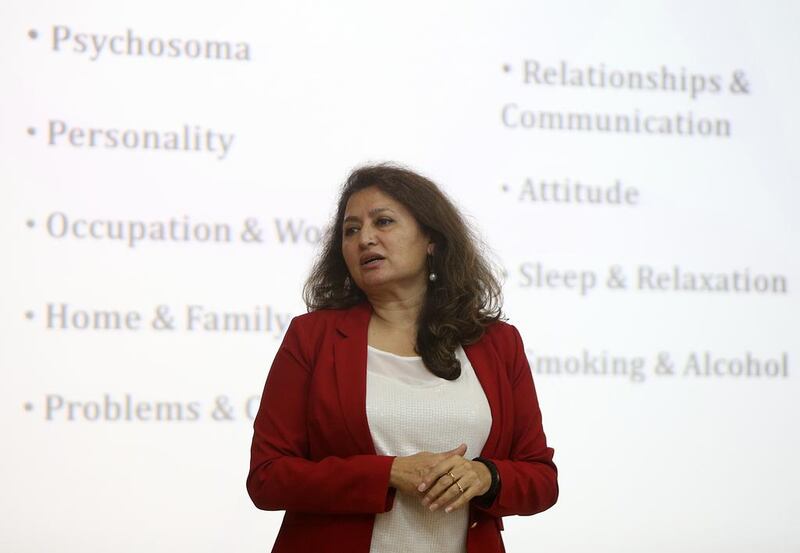DUBAI // The battle against mental health problems must start at school age, as knowledge will reduce the stigma surrounding them and encourage those in need to seek help, experts say.
Dr Savita Menon, a clinical psychologist who works in Ras Al Khaimah, has been running workshops at schools and universities to educate on mental health and treatments.
“There is still a stigma all over the world about talking about mental health issues,” Dr Menon said. “These workshops are important to reduce that.
“The more we talk about it and bring it out into the open, the more people feel they can accept and manage these issues.”
In her workshops, she talks about the importance of sleep, exercise and diet in maintaining optimal mental health.
“The start of any problem is when you’re young,” Dr Menon said. “In RAK we’re visiting a lot of schools. Parents take things seriously when it comes to their children’s health but not their own, so to reach the parents’ health, the best way is through their children.
“If you want to make real change, preventive change, it’s the younger population you need to access. If society paid more attention to child and school health, it would make a big impact.”
Mental health is now on the national agenda. Last month, members of the FNC requested that the creation of a psychiatric health law be accelerated.
They recommended that psychiatric services be readily available, there be a psychiatric clinic in every hospital and that well-being skills are taught in schools.
Counsellors in universities are a vital part of this.
“They need to be out there more, though, more visible, making themselves approachable,” Dr Menon said.
“Only then will they find students knocking on their doors to talk to them. Only when you feel comfortable with someone do you meet them.”
Dr Cedwyn Fernandes, campus director at Middlesex University, which last month ran a mental health awareness event, agreed that students needed psychological support.
“Many of the problems students have are home and family-related, rather than study,” Dr Fernandes said. “A lot of cross-cultural issues come up between the students, who are quite modern, and their parents, who may be more traditional.
“They also suffer with anxiety, depression. We want them to know there are avenues for help when there are issues.”
Dr Justin Thomas, a psychologist and lecturer at Zayed University, said it was essential to have support on campus.
“It’s hard if a teacher has to perform the role of emotional counsellor because it is potentially a conflict of roles,” Dr Thomas said. “Imagine if a student just told you she is suicidal and you grade her exam paper with an ‘F’.
“Having that dedicated support role is essential. I think a key challenge is to overcome the social stigma often associated with seeking help.”
Dalia Jarara is one of two psychologists working as counsellors at Abu Dhabi University, which this year ran 12 events specifically to address the issue of mental health.
“Support is important,” Ms Jarara said. “Students are confused and vulnerable. We have a very diverse population. Some people are new to the country, which is a huge adjustment, while for others just adjusting to university life is a huge change.
“I’ve experienced everything when it comes to mental health, although the majority deal with stress and time management. Problems at home with family, not coping with university – these things that can lead to suicidal thoughts. It all starts with stress.”
The stigma about seeking help is not as strong now, she said.
“It’s still very important to them that nobody knows about it, their friends, family, professors. Counselling is still a new concept in this part of the world, but the numbers coming to us are increasing.”
mswan@thenational.ae





